The meat of a pay-per-click campaign happens in the brainstorming room. If you lay a solid foundation of goals, a target audience, and a marketing message ahead of time, you will be in great shape to design the most advantageous Adwords campaign for your hotel or other business.
Blue Magnet works with a variety of different hotels and other hospitality businesses and we have seen time and time again that if you follow these seven easy steps, your PPC campaign will bring in the ROI you seek.
- Step 1: Set a concrete goal, KPI, and ideal audience
- Step 2: Figure out the timing
- Step 3: Create an incentive
- Step 4: Gather the materials you need
- Step 5: Build a unique landing page
- Step 6: Set up the ad campaign in Google Adwords
- Step 7: Launch campaign
Let’s dive into these steps a little deeper, shall we?
Step 1: Set a Concrete Goal, KPI, and Ideal Audience
Concrete, Attainable Goal
Setting a concrete, attainable goal right from the start is imperative to creating a successful campaign.
Ask yourself, “What result do I want from this campaign?” Your first instinct may be simply to reply, “More heads in beds,” or “More revenue.” Once you have set your goal, turn it into something concrete and measurable.
Don’t: Abstract Goals for Hotels
- Fill vacant rooms during slow periods.
- Get more wedding and corporate meeting event business.
- Build brand awareness.
Do: Concrete Goals for Hotels
- Get 15+ people to book a special during a specific need-period.
- Receive 30+ RFPs per month.
- Reach 10,000+ people through brand awareness ads.
See the difference?
If your goal is abstract, you cannot be certain your campaign is successful because you have no benchmark for success. The abstract concept of simply gaining “more business” is relative and not specific. For example, imagine the hotel sells one room as a result of a campaign. The hotel received “more business” and would have hit the abstract benchmark. However, you would rarely consider gaining one room the mark of a successful campaign, would you?
Similarly, do not just set a concrete goal, set a realistic goal. You may be tempted to pull out the phrase, “If we shoot for the moon and miss, we’ll still land amongst the stars,” but that is not how ecommerce works. In actuality, if you set an unrealistic goal you know you will never reach, you also cannot measure a campaign’s success.
Setting concrete, realistic goals is not hard but may take some experience. That is where the professionals come in handy. Building a campaign with ecommerce professionals like those at Blue Magnet enables hoteliers to receive expert consultation on what a realistic, attainable benchmark for success looks like so they can adequately measure their campaign.
With your realistic goal poised as the big “X” on the treasure map of your campaign, you know where the campaign needs to go. Now you just need to determine how to get there.
Key Performance Indicator
What do you want people to do when they see your ad? How will you measure your campaign’s success?
When you determine your concrete goal, you must figure out your key performance indicators (KPI) in tandem. The easiest KPI is usually a the number of clicks on a booking button with event tracking on it. Every time that button is clicked by a person to book a room, the tracking captures that data. Button clicks becomes your KPI, but you can not use button clicks to measure every type of goal. Let’s look at those past campaign goals for a moment.
- Get 15+ people to book a special during a specific need-period (KPI = clicks on booking button)
- Receive 30+ RFPs per month (KPI = RFP submissions)
- Reach 10,000+ people through brand awareness ads (KPI = impressions)
If your goal is exposure, you can not measure a campaign’s success through button clicks because that is not how people will interact with your ad. You do not even need them to interact with the ad to get the result you’re looking for. Therefore, you might measure the success by impressions, the number of times the ad serves to a relevant user.
Audience
Who do you want to see your ad? Your gut reaction spurts out, “I want everybody to see the ad!” No. No, you do not want everyone to see this ad. Then your experienced marketing brain kicks in, and you say to yourself, “If we target everybody, we capture nobody.”
If your goal is to get people to attend a NYE party at your hotel, you may want to set your ads to only display within a 50-100 mile radius of the hotel so only relevant people will see the ad. It is a waste of resources to spend money on ads served to people three states over who would never perform the action you are looking for.
Similarly, if your Chicago hotel is called “Hotel Blue Magnet” and there is a completely unrelated hotel in Hong Kong also called “Hotel Blue Magnet”, you do not want people to accidentally click on your ads when they are looking for a completely different hotel in another country. It is a waste of your ad spend. To avoid this, you filter out terms like “HK” or “Hong Kong” to refine your targeting to the people you want to see the ads.
In the brainstorming room, take a moment to clearly define your ideal target audience with everyone involved with the campaign. You will be thankful later on.
Step 2: Figure out the Timing
“Every market has seasonality to an extent, but for hotels it is a big determining factor. So if you do not get the timing right, your campaign may not be as successful.” – Tyler Young, Paid Media Strategist at Blue Magnet Interactive
Let’s say you want to run a wedding venue campaign to get more RFPs next year. You want to dedicate more ad spend during periods of time when more people are seeking wedding venues, right? Well, you’re in luck! Data shows the two weeks before and after December 25th are the hottest time for newly engaged couples search for wedding venues. Budget for and prepare to run your wedding venue campaign during these hot periods to maximize the impact of your campaigns so you will gain floods of RFP submissions.
Likewise, your historical data might show few people search for hotels in May and September because this is when the school year begins and ends, and families are too caught up with school activities or finals to focus on travel. With this knowledge, you may want to put less spend towards family leisure travel during this period and more towards senior leisure travel or corporate business.
Step 3: Create an Incentive
Unfortunately, you cannot throw money at an ad saying, “Stay at this hotel this weekend, we’ve got lots of rooms available!” and expect people to do just that. Design a real incentive for people to perform the action you want them to do.
Create an Appealing Package or Special Offer
One way to create more incentive for people to book with your hotel is to create a special offer that is a genuinely good deal for the potential guest and also incredibly unique.
Here are some successful package examples:
Kinzie Hotel pampers their guests with a ton of unique specials such as the Chicago Foodie Package.
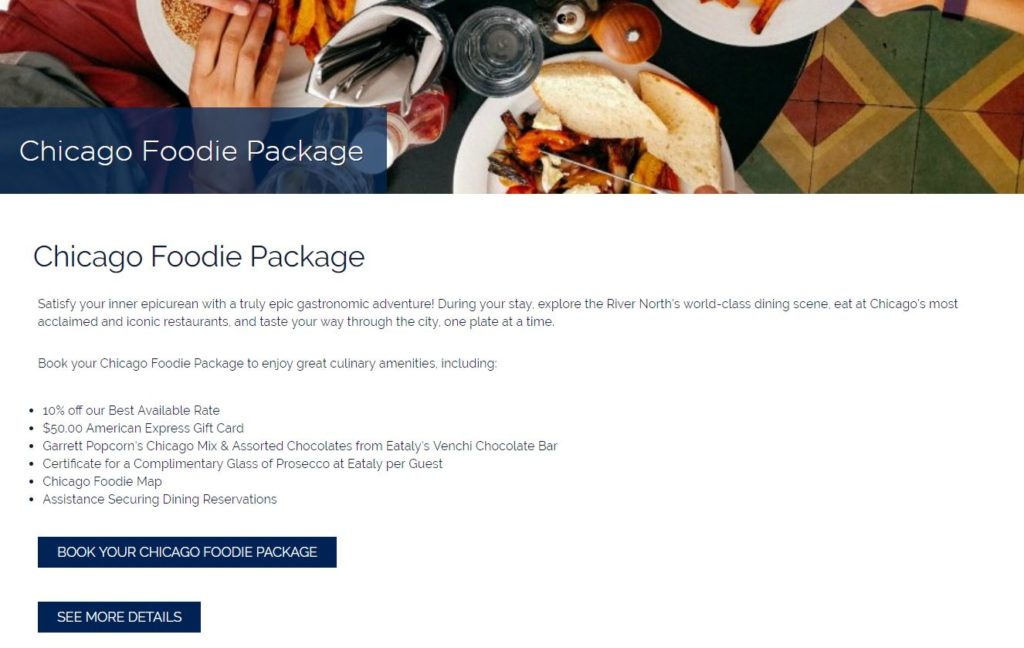
Why it Works: Without prior research or stress, this package enables food-loving tourists to easily experience the highlights of Chicago’s famous food scene right when they get to the hotel. Kinzie Hotel is not just providing the bed to sleep in, it is providing concierge services to enhance people’s entire vacations.
Cambria Southlake’s Football Gameday Getaway Package.
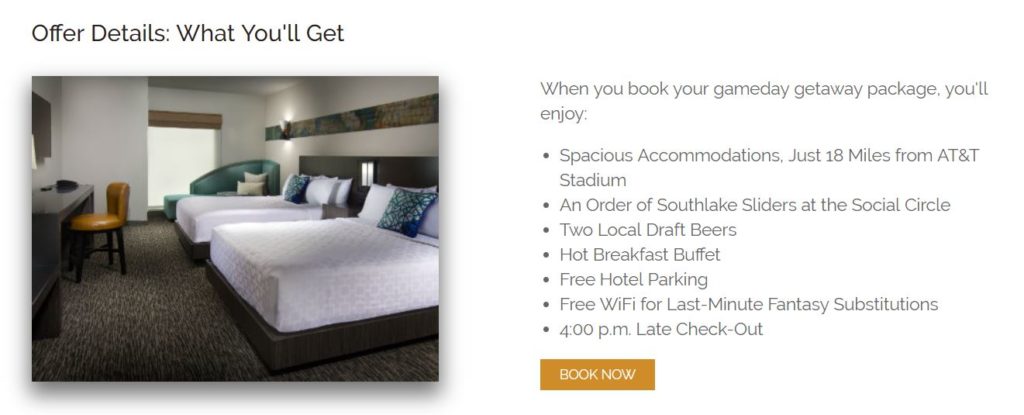
Why it Works: Even though this hotel is 18 miles from AT&T Stadium, guests book this package for football games because the experience they get by staying there for games – the personalized touch of sliders, local beers, late check-outs, and other perks.
As a testament to the package promotion’s success, Beverly Brantley, Director of Sales at Cambria Southlake shared, “This package has been a great success for us and we’ll continue running similar packages during football season.”
As our final example, the Crowne Plaza Atlanta Midtown partnered with the Georgia Aquarium to give guests a one-of-a-kind Georgia Aquarium Package they can only get if they book with the hotel.
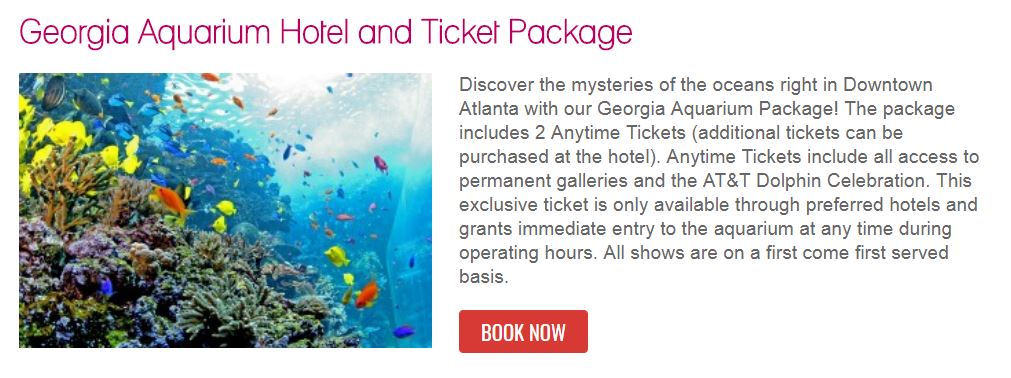
Why it Works: Exclusiveness is a huge incentive to book! The only way guests can get this package is to book with a preferred hotel such as this one.
All three of these package examples are unique, well-thought out, designed with the audience in mind, and present real perks that guests could not get anywhere else. The other thing they all have in common is they don’t try to capture every audience. Not every person will like the Chicago Foodie Package, and it is not trying to capture everyone. But the foodies who do see this package will love it because it speaks to them and their specific needs.
On the flip side, Blue Magnet has seen many hotels put together packages that garnered good results, but not the ones they were expecting. One hotel created a summer package that offered a reduced rate, free breakfast, and a late checkout.
PPC Campaigns Need Realistic Goals
Much to the hoteliers’ shock, simply providing a reduced rate, free breakfast, and a 2:00 pm late checkout was not enough incentive for people to book that specific special. The ads appealed to people at first – over 2,000 people arrived on the page, but once they landed and read the special they did not book the special in throngs like the client had hoped. Fifteen people booked the hot deal package, but the client was hoping for 50+. (This was also a case of not setting a concrete, attainable goal)
Despite all this, the campaign was actually a success. Over the two month period when the ads ran, visits to the site increased +41% YOY, general room nights booked went up +16% YOY, and overall revenue from the site increased +39% YOY. The ads still helped increase visits, bookings, and revenue. But site visitors who came through the ads did not make the actions the hotel desired – booking a specific package. If the hotel made the package more unique, perhaps they would have seen the desired effect.
Your Offer is Appealing on its Own so Create a Compelling Message/Imagery
Now you may not need to create an incentive if what your hotel offers is incentive enough.
The Crowne Plaza Atlanta Midtown had a stunning 25th floor event room with great views of the city skyline. However, it did not have the proper advertising and did not seem any more unique than any other general hotel event space from an online perspective. The hotel team worked with Blue Magnet to rebrand the space and market it as something separate from the Crowne Plaza brand, and the success was astounding.
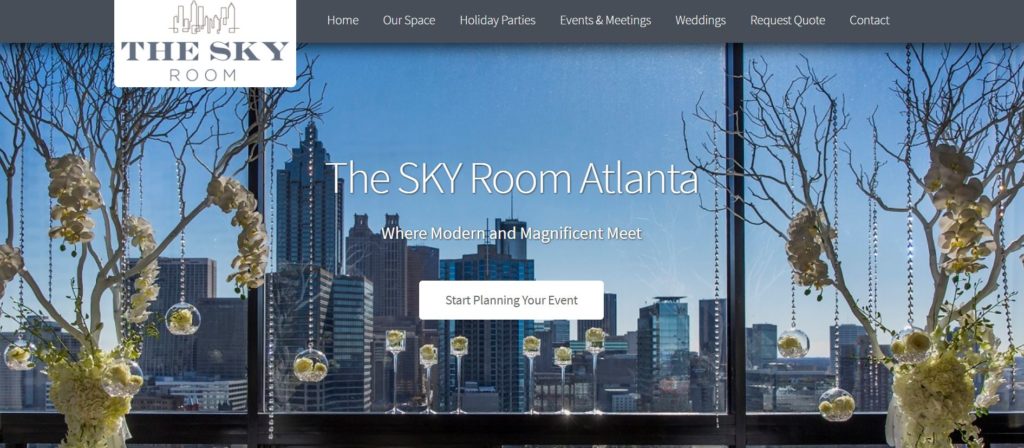
In 2016, without the added marketing, the hotel received 324 RFPs for the entire year. In 2017, when the hotel changed its marketing strategy and advertised the SKY Room differently, they gained 895 RFPs total for the year. That means the SKY Room site brought in an additional 571 RFPs in 2017 that the hotel was not bringing in in 2016. That’s a 176% YOY increase in RFPs! The hotel made almost $100,000 in event bookings in the just first three months of the campaign which is more than they made the entire previous year!
In short, their space was already incentive enough; they just needed to spend time and money to properly brand the space and reach audiences through well-timed PPC ads.
Step 4: Gather the Materials You Need
Once you organize the logistics of your campaign, you need to collect all the items needed to implement it. Your hotel’s PPC campaign might need:
- Photography
- Logos
- Usage rights
- Booking links
- Tracking
- Phone numbers
- RFP forms
If you are putting together a specific package, make sure you have it set up in the reservation system. Similarly, make sure you have a booking link for the special as soon as possible in order to send people to the correct location.
Putting together a campaign is like baking a cake; you need all the ingredients ahead of time before you bake it in the oven.
Step 5: Build a Unique Landing Page
If you want a highly successful ad campaign, build a unique landing page for exactly what you are selling. Don’t rely on a preexisting page that is partially relevant.
Why? Because having a highly relevant landing page will increase the relevancy of your ads and give it a higher chance of converting. It can even reduce required bid amounts and wasted spend.
In this video, Hal Varian, Chief Economist at Google, explains Google AdWord’s paid search auction system, and how relevance can have a dramatic impact on a paid search campaign’s cost and performance. Insights on the AdWords Auction. He shares the three major determining factors for Ad Rank in the AdWords Auction: bid amount, quality of the content, and formatting. If the ad points visitors to a highly relevant landing page that is both easy to navigate and transparent, your ads will have a higher chance of showing up in Google search results, even over a competitor who may bid higher.
Unique Landing Pages Improve Ad Rank
Not only does building a unique landing page help Ad Rank, it also improves user experience and ultimately, the conversion rate. If you send potential guests to a specials page with a variety of specials rather than just the package you are advertising, they may have trouble finding the exact special that interested them in the ad, get frustrated, and leave without converting. Instead, if you send them to a specific landing page with with specialized content catered for the audience who clicked on the ad, people will feel confident in what they are about to buy and perform the action you want them to.
So if you have a football special you want people to book, don’t just link ads with the Specials Page with ten different deals listed. Instead, create a unique landing page for that specific special to help improve Ad Rank.
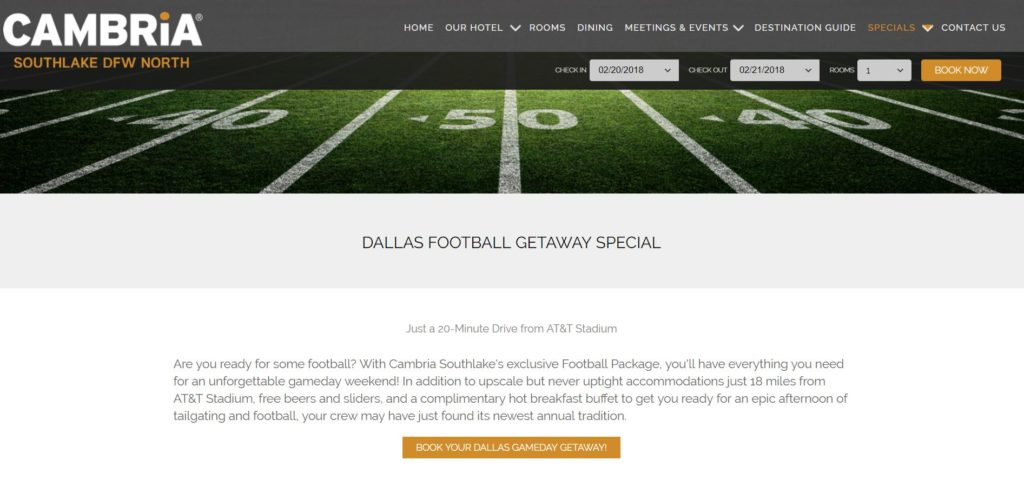
For example, Blue Magnet and this hotel put together a special landing page about the local renaissance faire and tailored it to that loveable quirky audience. In this case, the Renaissance Faire was so impressed by the authenticity of this page they reached out to the hotel, partnered with them, and developed a specific package for Renaissance Faire visitors to book with this hotel.
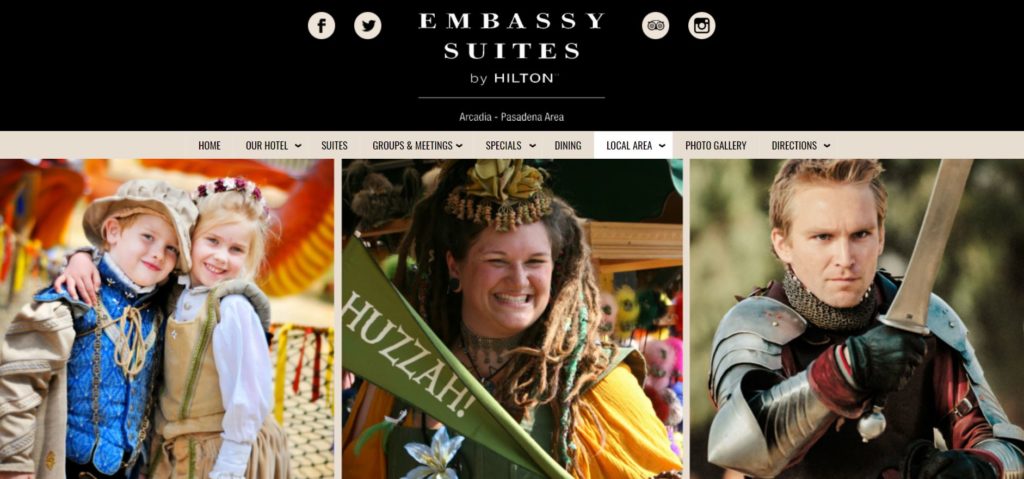
Step 6: Set Up the Ad Campaign in Google AdWords
Once you have the landing page, booking link, photos, and all the other logistics figured out, it is time to build this campaign in Google AdWords!
Will Your Ad Campaign be Display or Search?
There are two main ad mediums: display and search.
Display ads are a type of ad that incorporate text, images, videos, audio, and more. You know those banner ads that show up on websites as you are browsing the web? Those are Display Ads. Here are a few examples:
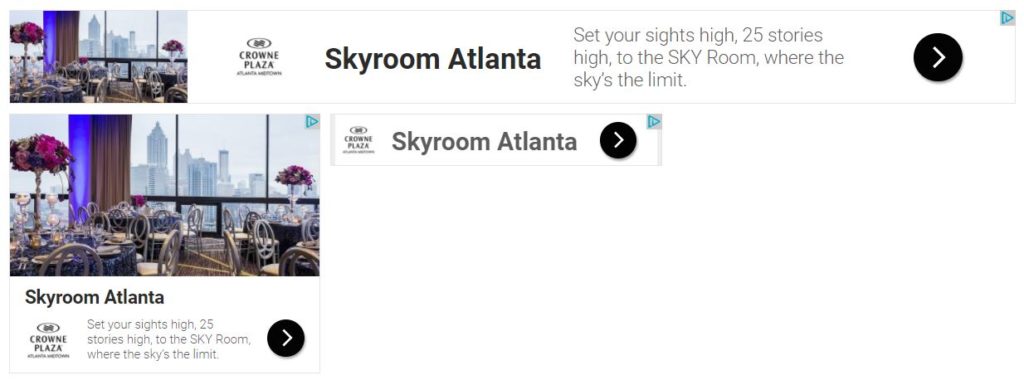
Search ads are the all-text ads that appears at the top of search engine results when people type in queries. You have seen these before too – here is an example:
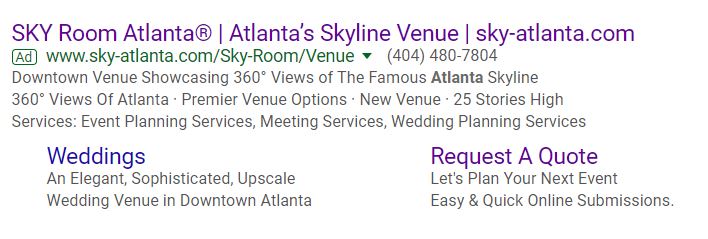
The general “guideline” for picking which ad type to use is if your goal is to bring about long term brand awareness, use Display. These image-heavy ads appear on relevant websites. People who view them may not be looking to book a hotel that instant, but they’ll see the ad and you’ll spread brand awareness so down the line they may be familiar with your hotel name and book.
Likewise the general “rule” for when your goal is to drive bookings, RFPs, or other concrete actions, use search advertising. With search, your ad dollars are being spent on people actively searching for you business or products in real time, so they are more likely to click on your ad and perform the action you’re looking for vs. display where people are not necessarily actively looking for your business.
PPC Ads Are Versatile
However, those are not the only ways to use those ads – there are a lot of different ways to use both search and display creatively. For example, if your objective is generating a direct response, like a booking, you can use display remarketing with a discount.
What would that look like? Say Jane Smith visits the Hotel Blue Magnet website while doing research on which hotel to stay at on her vacation. She looks at the pricing and leaves to look at more options. A day later, she is on a website about Chicago attractions and sees a display ad that says, “Book Hotel Blue Magnet Today for a 25% Discount on Your Room!”. She thinks, “What luck!” She remembers visiting the site before and how nice the hotel pictures were, she clicks on the ad, and books. She may not have been ready to book the first time she visited the website, but with the good timing of the discount, she is the second time.
What Targeting Functions will you Use?
Remember how we discussed defining the audience in the brainstorming room? It is time to bring back that info for establishing the ads’ targeting functions. Determine who you want to see your ad and which functions you need to use in order to reach that target audience. Will this be location-based keyword targeting? Geo-targeting? Targeting people based on the websites they go to?
For example, if you want people to see your wedding ad when they live in your city and type in “wedding venues in ___,” you may want to set up location-based targeting.
Similarly, if you want people to see your wedding ad when they are on wedding dress websites, and not specifically looking for the venue at this moment, you may want your ads to show up to an affiliate audience in the Display Network. Note: in market and affiliate audiences are not available in search, just display.
Now if you want your ads to show up when people type in relevant search queries, that is when you want to use search.
Setting Up Keyword Targeting and Campaigns
Keyword Planner is a good place to start for keyword inspiration. From it, you’ll develop a general list of relevant keywords. However, it’s not a good resource for budgeting or intricate SEO.
When setting up keyword targeting, bundle relevant keywords into campaigns with related themes. For instance, you may have one campaign about selling your event space as a wedding venue and another campaign about selling your hotel as a corporate event venue. Both campaigns are selling the same space, but the audience, copy, and keyword targeting differs from campaign to campaign.
Be conscious of what you do not want to show up for just as much as what you do want to show up for. If your hotel is Hotel Blue Magnet in Chicago, you do not want to show up with people are looking for “Hotel Blue Magnet in Hong Kong”. Make sure you add Hong Kong terms to the negative keyword list.
What Ad Copy and Ad Extensions do you want to use?
You do not have a lot of space to work with, so think carefully about your message within the headline limitation.
Your headline should include the main keyword you’re targeting and as much meat as possible. SearchEngineLand’s article on PPC content mentions how users are likely to gloss over text, so do not save your best selling point for a smaller section in the ad; include it right up top in the big blue letters.
You also can choose the display URL. Now this may not be as pertinent for independent sites with short URLs, but if you are linking to a webpage with an extremely long URL, you can make the display URL shorter than the one you are actually sending users to in order to improve CTR.
Finally, let’s talk about ad extensions. There are a variety of different ad extensions that can improve the overall quality and effectiveness of your ad like site links, call extensions, call outs, structured snippets, and more.
Site links show a variety of pages on a website rather than just one. Call extensions are mobile extensions that allow people to click on the call button right on the ad to call the hotel right away. Here is an example of a mobile ad that has both site link and call extensions.
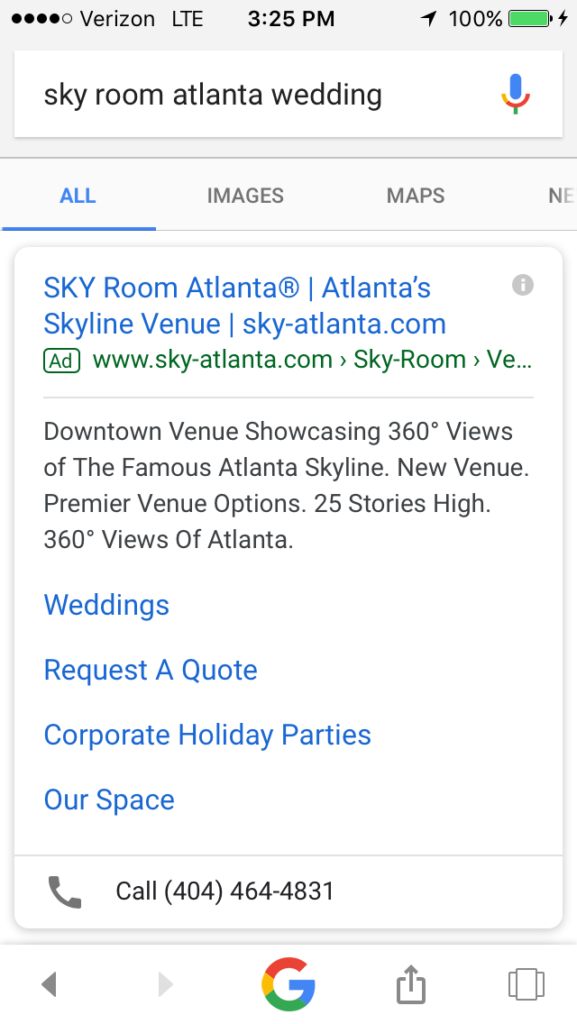
A frequently asked question Blue Magnet gets from hoteliers is, “I saw one of your ads yesterday and it didn’t have sitelink extensions. Why is that?” Extensions do not show up every single time an ad appears on SERPs. Google’s algorithm determines when and where the sitelinks appear. So although you can enable and encourage certain extensions to appear, Google determines when and where they show up based on if it predicts the ad extension will improve your CTR and what your overall rank is.
Step 7: Launch Campaign
Once your ad campaigns are all set up, you launch it! Then you track it, learn from it and measure the results.
You have the knowledge. You have the drive. You are ready to start your very own pay-per-click campaign to bring in more revenue for your hotel.
If you need some help, Blue Magnet has a team of experienced PPC experts at the ready to propel your campaign idea out of the brainstorming room and into the real world. Read more about Blue Magnet’s creative and flexible pay-per-click services We encourage you to contact us with your questions and ideas – perhaps we will even have the honor of working with you in the future!




